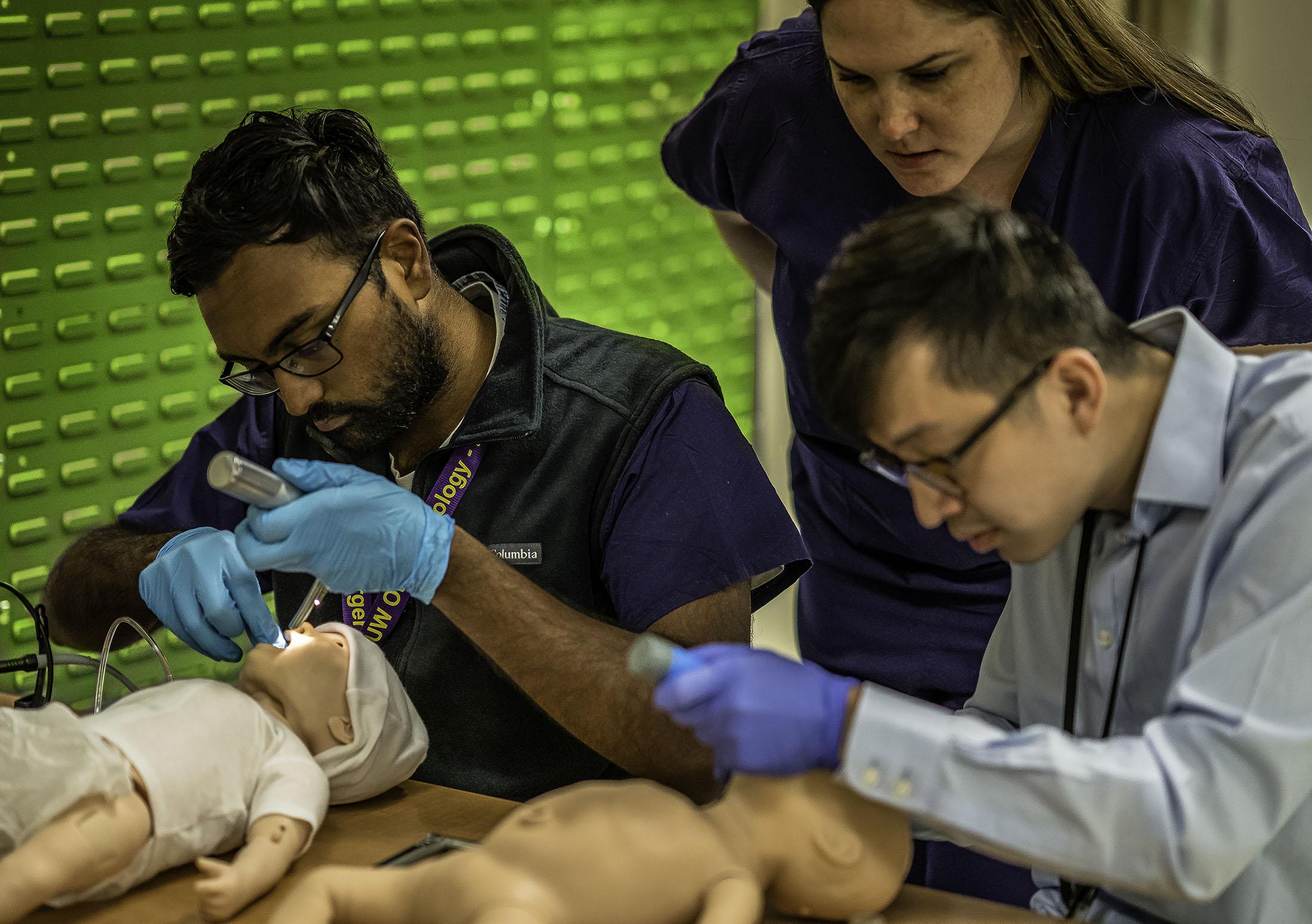How Otolaryngologists Use Modern Tools to Treat Difficult Cases
How Otolaryngologists Use Modern Tools to Treat Difficult Cases
Blog Article
Checking out the Field of Otolaryngology: What to Expect When You Speak With an ENT
Otolaryngology, generally referred to as ENT, encompasses the diagnosis and treatment of nose, throat, and ear conditions. For those experiencing associated issues, seeking advice from an ENT expert can provide clearness and relief. Understanding what to anticipate during such consultations is essential for reliable communication and care. This introduction will outline key facets of the ENT experience, including usual reasons for gos to and the procedures associated with medical diagnosis and therapy.

Understanding Otolaryngology: An Overview
Otolaryngology, commonly described as ENT (Ear, Nose, and Throat) medicine, is a specific branch of medication that concentrates on the medical diagnosis and therapy of problems affecting these crucial areas of the human body. This field encompasses a variety of conditions, including those pertaining to hearing, balance, respiratory feature, and speech. Otolaryngologists are trained to handle both surgical and clinical treatments, utilizing sophisticated methods and innovations. Their experience expands beyond conventional ailments, addressing issues such as allergic reactions, sinus infections, and hearing loss. Additionally, they play an important role in the management of head and neck cancers cells, supplying comprehensive care customized to specific client needs. Generally, otolaryngology continues to be necessary for keeping health and wellness and lifestyle in affected individuals.
Usual Reasons to See an ENT Professional
Many people look for the proficiency of an ENT expert for a variety of factors, mirroring the varied nature of conditions that impact the ear, throat, and nose. Typical problems consist of persistent sinus problems, which usually brings about relentless nasal blockage and face discomfort. Allergies and their associated symptoms, such as itching and sneezing, additionally motivate check outs to these professionals (ENT Clinic). Hearing loss, whether steady or abrupt, is another significant reason for examination. Additionally, people might look for examination for throat conditions, including persistent hoarseness or swallowing difficulties. Rest apnea, identified by interrupted breathing during rest, is regularly addressed by ENT experts too. Each of these conditions highlights the value of specialized treatment in managing intricate ENT-related health problems
Planning for Your ENT Appointment
When planning for an ENT visit, it is necessary to gather relevant info and think about any type of specific issues. Patients should put together a detailed case history, including previous ear, nose, or throat problems, surgical procedures, and present medications. Recording signs-- such as regularity, severity, and period-- can give beneficial insights for the ENT professional. Additionally, individuals ought to prepare a checklist of questions they desire to ask, making certain that all issues are resolved during the see. Bringing along any type of relevant medical records or examination outcomes can further assist the ENT in recognizing the patient's condition. Ultimately, people ought to verify their consultation information, consisting of date, time, and location, to minimize any type of final confusion. Proper prep work can enhance the effectiveness of the consultation and result in much better end results.
What to Anticipate Throughout the Assessment
As the examination starts, the individual can anticipate to engage in a detailed conversation with the ENT professional about their signs and case history. The specialist will certainly inquire concerning the period, frequency, and intensity of signs such as hearing loss, nasal congestion, or sore throat. In addition, the person's previous see here now clinical conditions, drugs, and any kind of appropriate family background will be reviewed, helping the expert in developing a complete understanding of the client's wellness. The ENT might additionally inquire about lifestyle elements, such as exposure to irritants or irritants. This open discussion develops a foundation for the appointment, guaranteeing that the individual's worries are dealt with and setting the phase for any kind of necessary i thought about this analyses or suggestions for treatment.
Diagnostic Examinations and Procedures in Otolaryngology
A variety of analysis tests and treatments are vital in otolaryngology to properly examine and diagnose problems influencing the throat, ear, and nose. Typical examinations include audiometry, which determines hearing function, and tympanometry, assessing middle ear pressure. Nasal endoscopy permits visualization of the nasal passages and sinuses, while laryngoscopy checks out the throat and vocal cords. Imaging strategies, such as CT scans and MRIs, offer thorough views of head and neck structures. Allergic reaction testing may additionally be conducted to determine triggers for sinus or respiratory system issues. These analysis tools enable ENT experts to create a thorough understanding of individuals' problems, guaranteeing tailored and reliable administration plans. Appropriate diagnosis is essential for effective treatment end results in otolaryngology.
Therapy Choices Used by ENT Specialists
ENT professionals supply a selection of treatment options tailored to deal with specific conditions affecting the throat, Resources nose, and ear. These therapies range from conventional techniques, such as medicine and way of living modifications, to more intrusive treatments. For instance, allergic reactions may be handled with antihistamines or immunotherapy, while chronic sinusitis could need nasal corticosteroids or sinus surgical treatment. For hearing loss, ENT specialists often suggest listening devices or surgical interventions like cochlear implants. In cases of throat conditions, alternatives can include speech therapy or medical treatments to remove blockages. In addition, they might offer assistance for managing rest apnea, consisting of using CPAP gadgets or surgical treatments. Generally, the objective is to improve patients' lifestyle with customized treatment and efficient therapy approaches.
When to Look For Follow-Up Care With an ENT
Identifying when to seek follow-up treatment with an ENT expert is vital for handling recurring signs or complications associated with ear, throat, and nose conditions. People must consider setting up a follow-up appointment if signs linger regardless of initial therapy, such as persistent ear discomfort, nasal congestion, or throat pain. Changes in hearing, balance problems, or uncommon nasal discharge may likewise require further assessment. In addition, if a patient experiences negative effects from recommended drugs or has gone through a surgical procedure, follow-up care is essential to monitor healing and resolve any kind of problems. Timely examinations can assure reliable administration of problems, prevent potential problems, and supply satisfaction relating to one's health and wellness. Seeking follow-up treatment advertises aggressive wellness management in otolaryngology.
Frequently Asked Questions

What Certifications Should I Look for in an ENT Specialist?
When looking for an ENT specialist, one need to seek board certification, pertinent experience, and solid person evaluations. Additionally, reliable communication skills and a caring strategy can considerably boost the general therapy experience.
Exactly how Do I Pick the Right ENT for My Needs?
Selecting the right ENT expert includes examining their credentials, experience, and patient reviews (Otorrinolaringologia). It is necessary to ponder their interaction style and strategy to treatment, ensuring they line up with the person's particular health and wellness needs and preferences
Exist Any Dangers Connected With ENT Procedures?
The risks connected with ENT treatments might include infection, blood loss, anesthetic difficulties, and potential damage to surrounding structures. Individuals ought to review these risks with their doctor to comprehend private problems and guarantee informed decisions.
Just How Can I Manage Anxiety Before My ENT Visit?
To manage anxiety before an appointment, individuals can exercise deep breathing workouts, imagine positive end results, prepare questions ahead of time, and seek support from friends or household, promoting a sense of reassurance and peace.
What Should I Do if I Experience Adverse Effects From Therapy?
If negative effects from therapy happen, the person ought to quickly report them to their doctor. Modifications to treatment or additional treatments might be required to ensure safety and effectiveness in handling their condition - Sinus. As the assessment begins, the individual can expect to engage in a complete discussion with the ENT professional concerning their signs and clinical history. These diagnostic tools make it possible for ENT experts to develop a detailed understanding of patients' problems, ensuring customized and efficient management plans. ENT professionals provide a range of treatment alternatives tailored to address details conditions influencing the nose, ear, and throat. When seeking an ENT professional, one should look for board qualification, appropriate experience, and solid client testimonials. Choosing the ideal ENT specialist includes evaluating their certifications, experience, and patient testimonials
Report this page